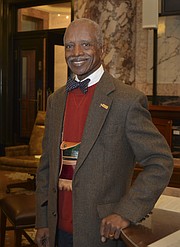Photo by Trip Burns.
May 15, 1970, Hillman Frazier, then a junior at Jackson State University, returned to campus after dinner and encountered a roadblock.
Students had spent the day protesting the U.S. invasion of Cambodia during the Vietnam War, and local and state police were bracing for a clash with protesters. When the night was over, two young men, Phillip Gibbs and James Earl Green, with whom Frazier had a political-science class, had been killed.
"One of the things that shooting did was it made us more focused. A lot of the student leaders at the time went on to graduate and law school," says Frazier, who majored in political science at JSU, was active in student government and later attended George Washington University Law School in Washington, D.C.
Frazier, 64, was born in Jackson. His mother was a homemaker, and his father was a carpenter and, later, a Baptist minister. Despite the family's Protestant faith, Frazier attended Holy Ghost Catholic School, St. Joseph Catholic School's sister school for people of color.
Today, Frazier's office on the first floor of the Capitol is a shrine to his more than three decades in public service.
After working for a legal services office and four years on state House Speaker C.B. "Buddie" Newman's staff, Frazier ran successfully in 1979 for the Mississippi House of Representatives. Thirteen years later, Frazier won election to the state Senate.
Much like his Capitol office, Frazier's tenure in the state Legislature is a testament of preserving Mississippi's civil-rights history through the legislative process, which is no easy feat. For example, he sponsored a resolution to recognize Rev. Martin Luther King Jr.'s birthday a state holiday, which met resistance from conservative lawmakers who argued that having another holiday would hurt the productivity of state employees. Frazier argued that recognizing Dr. King's birthday wouldn't cost a dime because the state already celebrated Confederate General Robert E. Lee's birthday.
Frazier, who traveled to South Africa to monitor the nation's first post-apartheid election in 1994, also authored a bill to formally adopt the 13th Amendment of the U.S. Constitution, which formally—albeit symbolically—abolished slavery in Mississippi in 1995.
"I knew that if I'm going to go around the world telling folks about our great democracy, I knew that we had to correct certain things in my state," Frazier says.
Frazier's love of history continues outside of the statehouse walls, where he spends his free time with his wife of 34 years, Jean, their adult children and two grandchildren, and tinkers on his classic cars.
The senator says restoring cars helps him relax and that he is not interested in growing his hobby into a business. "I don't want to mess up anybody else's cars," he says with a laugh.




Comments
Use the comment form below to begin a discussion about this content.
comments powered by Disqus